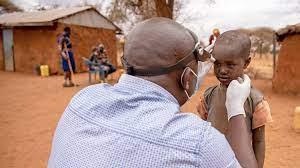
https://www.sightsavers.org/news/2023/12/sightsavers-pledges-60-million-...
The funding will be channelled into programmes to protect people from the harmful effects of five neglected tropical diseases (NTDs) – trachoma, river blindness, lymphatic filariasis (LF), schistosomiasis and intestinal worms.
Sightsavers’ chief executive Dr Caroline Harper said: “I’m thrilled to announce this new funding, raised from public donations and major international donors, which will help us to end the devastating health, social and economic consequences of NTDs.
“Sightsavers has been fighting NTDs for decades, working closely with communities and governments in endemic countries. We’re now at the stage where, with the right support, it’s possible to eliminate some of these diseases as a public health problem. Eliminating NTDs will have a positive impact on individuals, families and communities, enabling more children to learn and more adults to earn.”
Dr Harper announced the new funding during the Reaching the Last Mile Forum, a conference on disease elimination that took place on 3 December as part of the COP28 climate summit in Dubai.
Reaching the Last Mile is a partnership between the Bill and Melinda Gates Foundation, the Carter Center, the END Fund, the United Arab Emirates and Sightsavers.
Collectively, organisations at the Forum pledged more than US$777 million towards eliminating NTDs. This included commitments to significantly increase the size of the Reaching the Last Mile Fund, with the ambitious goal of eliminating river blindness and LF in Africa.
Dr Harper said: “I’m proud that Sightsavers has joined with others in the Reaching the Last Mile partnership to support this expansion as part of our overall financial pledge at the Forum. These new commitments will go a long way in the fight against river blindness and LF.
“We now need other organisations to follow suit, and commit their support and resources towards this goal. Together, we can consign these diseases to the history books.”
At the conference, world leaders, donors and non-profit organisations discussed how climate change will affect the health of populations globally.
Dr Harper said: “We know that NTDs have a disproportionate impact on the poorest and most marginalised communities. These same communities are often the most vulnerable to the damaging effects of climate change.
“If we as a global community invest in NTD elimination and other global health initiatives, we will be helping low and middle income countries to strengthen their health systems and supporting them to face the challenges of climate change.”









